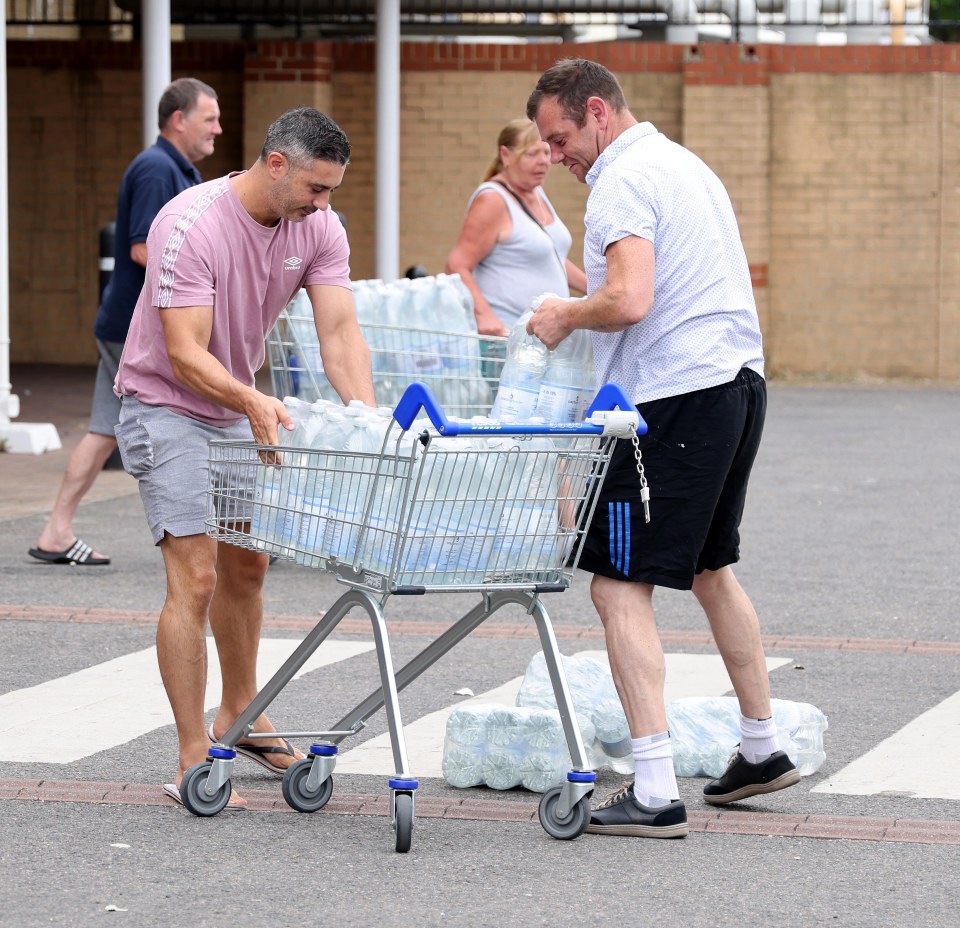AN ancient village sunk under a reservoir has emerged in the heatwave — as union bosses demand workers down tools.
The haunting ruins of West End — a tiny community dating back to the 17th century — are now visible after water levels fell dramatically as the temperature soared yesterday to a sweltering 30.1C (86F).
A former flax mill, main road and crumbling stone bridge can be seen in Thruscross Reservoir near Harrogate, North Yorks.
West End was flooded in 1966 to create the man-made lake.
Water firms have admitted reservoir levels are now well below average for this time of year as demand increases.
It comes as union bosses insist that all workers should down tools when the temperature hits 30C.
MORE ON THE HEATWAVE
The TUC said a maximum working temperature should be introduced — meaning millions would knock off from their jobs this week.
It said: “Working in hot weather can lead to dehydration, muscle cramps, rashes, fainting, and — in the most extreme cases — loss of consciousness”.
Workers at London’s Greenwich Council were yesterday allowed to take more breaks to cope with rising temperatures.
Jonathan White, legal and compliance director at the National Accident Helpline, said: “There are no laws which specify that workers can stop if the temperature gets too hot.
Most read in The Sun
“It is ultimately up to the employer to decide if it is too hot to work, but if you are uncomfortable, you should speak to your them as they are obliged to act reasonably.”
Meanwhile council bosses have scrapped events including fetes, school fairs, carnivals, markets and country walks ahead of the weekend.
Sports and social events were also cancelled.
Rail bosses warned that train services could be axed and journey times may double due to speed restrictions to stop tracks buckling.
WEATHER EMERGENCY
London Mayor Sadiq Khan triggered a severe weather emergency response normally reserved for winter as the Government’s Cobra committee was urged to meet.
He ordered councils to hand out water and sunscreen to rough sleepers. A rare amber warning for extreme heat was extended to Tuesday of next week.
Ministers and officials are drawing up plans with the NHS and councils — claiming the lives of vulnerable people, such as children, the elderly or those with existing health conditions, could be at risk.
Some hospitals have already declared “critical incidents” and every ambulance trust in England is on the highest level of alert.
Three fires continued to burn on Salisbury Plain, Wilts, caused by an Army live firing exercise. The MoD was considering using helicopters to quell the flames.
Working from home is thought to have increased demand for water.
Yorkshire Water said its reservoir levels were down a fifth on where they should be at this time of year.
A spokesman added: “North Yorkshire has had below average rainfall since autumn 2021 and a particularly dry spring and summer.”
Reservoir levels in the South West are down to some of their lowest levels in more than 25 years.
Burrator Reservoir, which serves Plymouth in Devon, is half empty. Ardingly Reservoir, in West Sussex, has dropped by a fifth in just a month.
And a South East Water spokesman said: “With continued hot weather, demand for water is exceptionally high.
“Combined with very little rainfall, this is putting immense pressure on our supply network.”
Northumbria Water said: “We are experiencing a dry and hot period and very high water demand.”
As drought fears grew, water firms begged customers to let lawns go brown, avoid washing the car and to turn off the taps when brushing teeth.
A hosepipe ban could be introduced if water levels fail to recover.
Locals on the Isle of Sheppey, Kent, spent two days without water after supplies there ran out.
Its 12 schools were closed as taps ran dry after pipelines burst on Tuesday morning and again that night.
Hundreds queued for miles to buy two-litre packs of water from Tesco.
Emergency water stations were set up to deliver 300,000 litres to 40,000 residents. Geoff Newman, 62, said: “It’s like a third world country.”
Read More on The Sun
The Consumer Council for Water said: “Water companies remain confident restrictions can be avoided this summer but it’s a situation that will be kept under constant review.”
The extreme heat is being compared to 2018 when drought conditions were introduced for the first time since 1976.














